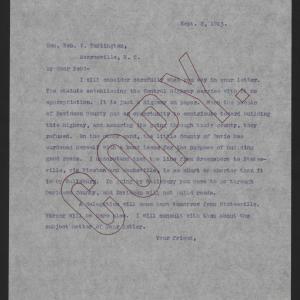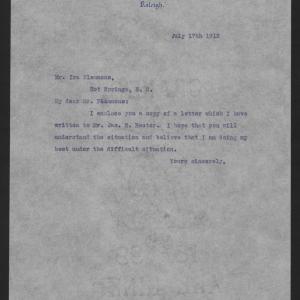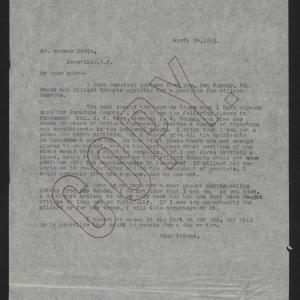Transcribed from "'Unwise and Dangerous' Declares Prison Board," from News and Observer (Raleigh), 9 July 1913.
The Honorable Board of Directors of the State's Prison:
Gentlemen:—
Entering upon my duties as Superintendent of the Prison under your direction on April 7th, 1913, I found a prison population of 821; 455 of these were upon the State farm, 93 at the Central Prison and 273 engaged in railroad construction.
At present there are but two sources from which the prison derives revenue for its support—the State farm and the labor engaged in railroad work. Ninety-eight prisoners were at work on the Norfolk Southern Railroad under a contract for three months for $1.50 each per day. This contract expired on June 10th and I renewed it for thirty days. Other contracts at the same price for labor have been offered me, covering, I think, as many as 300 prisoners, but I have not felt authorized to accept any of them until the requirements of the special acts of the Legislature granting convict labor on State account could be accurately determined and complied with. One hundred and seventy-five men were at work on other lines of road, as follows: The Atlantic and Transcontinental, 21; the Elkin and Alleghany, 65; the Statesville Air Line, 59; the Watauga and Yadkin River, 30. All this labor is on State account and is paid for in certificates of stock at their face value in the various companies employing it. The State pays for this labor about six thousand dollars per month. The prison will need all of its earnings for maintenance and the stock cannot be carried as a surplus. There are urgent and persistent demands from some of the roads for additional labor, and if these requests are complied with by you the expense to the State will of course be materially increased. Since the contract for the 98 men on the Norfolk Southern road has expired and because a portion of the large force at the State farm may be withdrawn for the next several months, additional labor is now available, and if you so direct will be immediately furnished. I am persuaded, however, that a misapprehension exists in the minds of many people with reference to the railroad work which is being done on State account. I cannot think it is generally understood that the State is paying in cash from its treasury month after month for this labor, and that in order to complete the roads already under construction this policy must continue for an indefinite period and perhaps at a greatly increased monthly expense. Is the State's stock in these roads for which it is paying par value in cash so secured that it cannot be lost or confiscated? It certainly ought to be and until it is further cash expenditure for the stock is not justifiable. Has the State, through expert engineers, inquired into the possibility or the feasibility or the practicability or the advisability and the probable cost of construction of any of the lines it is now engaged in building? Or is it expending an indefinite amount of public funds purely in recognition of the fact that railroads are good and useful things and the communities which have asked for them want them? Private funds could never be secured for investment in railroads without the most careful investigation of the proposed enterprises, and public funds ought to be expended with usual care and caution. It is said that State aid to some of these enterprises has been sought and is being used for the purpose of interesting and inducing the investment of capital from outside of the State. If the State lends its aid to an enterprise for the purpose of inducing others to invest their capital in it without sincere conviction after careful investigation that the investment would be safe and profitable, then the State is occupying a deceptive and an immoral attitude and such aid should be withdrawn. Would the building of a particular line of railroad benefit North Carolina, is one thing—would the building of a particular line of railroad prove a safe and profitable investment for the capital required, is quite another.
Prison Not Money Maker.
The impression seems to prevail in the public mind that for the past several years the State's Prison has been more than self sustaining and may be subjected to many and great burdens without danger of again becoming a charge upon the State. Many, if not most of our people, believe that the stock in the various railroads the State is now building with convict labor represents this surplus of prison earnings. This is not true and the impression ought to be corrected in justice to the State and particularly in justice to the management of the prison. During the last four years, according to the financial statement contained in the State Prison Reports of 1909–10 and 1911–12, the average monthly expenditure on account of the prison has been $15,573.81. The prison has in the State treasury today no funds with which to meet its monthly expenses except the certificates of stock it has earned. No further revenue can be expected from the State farm until the present crops are matured, harvested and sold. If, therefore, our monthly expenditure should prove the same as the average monthly expenditure for the past four years, the State will be called upon to pay $93,442.86 in each for railroad certificates from now until January 1, 1914.
Since my election as your superintendent, I have visited all the railroad work no receiving State aid.
The Atlantic & Transcontinental Railroad.
I have visited this work twice. I found 20 (now 18) prisoners under a full camp organization and engaged in construction work. The tools which the company had provided for the men were thoroughly worn out and utterly worthless. Four men were wheeling away the dirt and rock from a deep cut in the side of a high mountain as it was dug up and loaded upon barrows by fourteen others with picks and shovels. I was informed that no blasting material of any kind had been furnished in many months and that neither the superintendent nor any one representing him had been upon the work in the past three months, and that during the entire three years the convict force had been engaged on the line no party of engineers had been seen in the vicinity. Considerable work had been done along the mountain side for about three miles, but not part of it had been reduced to the proper width and grade for the laying of track, and for much of the distance only a narrow ledge had been excavated. Perhaps a third in length of the excavated line had been refilled by a competing company in the construction of their own line some 50 feet above the Atlantic & Transcontinental on the same mountain side. I do not know how valuable this railroad will be to North Carolina when it has been completed,—I do not know how profitable an investment it may prove for the many millions of dollars that will be required to build it,—I do not in the least question the sincerity of the motives of those who believe in and are promoting it, but I do say without hesitation that the work the State is now doing upon it is a mere sham and pretense. In my opinion the honor and dignity of the State is affected by it. Either this work ought to be at once discontinued or the sincerity and good faith of our State ought to be evidenced by furnishing an increased amount of labor and by requiring the company to equip it with proper working tools and to provide blasting material and other essentials for effective work, and on a scale proportionate to the undertaking.
The Statesville Air Line.
It is proposed, as I understand, that this road shall be built from Statesville through portions of Iredell, Yadkin and Surry counties to Mt. Airy. When completed to Mt. Airy it will tap three branches of the Southern Railroad and of course at three distinct points and yet will make no connection whatever with any other system. It will operate entirely in the Southern's territory and should be a valuable adjunct to that system without cost to it for construction, equipment or maintenance. That portion of it which will pass through Surry county to Mt. Airy must for a considerable distance practically parallel the Elkin & Alleghany Railroad now under construction with State aid, through the same county. Like the Atlantic & Transcontinental, this road has thus far been graded largely with prison labor on State account. I cannot believe it a good State policy to build this road from Statesville to Mt. Airy, touching three branches of the Southern road and still making no connection with another system. Even if the State is financially able to make the investment it seems to me that the best interest of the State demands that this line should be made to connect with the Elkin & Alleghany at Elkin, thereby forming a continuous line of State aided road far more valuable than the two lines could possibly be as merely local propositions. About 12 miles of this road from Statesville has already been graded, but no culverts have been built and no track has been laid upon any part of it.
The Elkin & Alleghany.
This is the oldest of the State aided roads. The proposed line extends from Elkin in Surry county to Sparta in Alleghany county and thence westward or northward. When completed this road will bring a large and valuable territory lying beyond the Blue Ridge into closer relations commercially and otherwise with the interior of our State. About nineteen miles have been graded, thirteen of this have been laid with track and trains under regular schedule are in operation over it. The company has built substantial culverts for the entire distance graded and has purchased and is operating a steam shovel which is aiding greatly in the construction work.
As previously stated, I believe this and the Statesville road ought to be made to connect road and form a continuous line. If this were done the State's stock might in the future prove to be a very profitable investment.
The Watauga & Yadkin River Railroad.
It is intended that this road beginning at North Wilkesboro should be built to Boone and thence westwardly. I am informed that the Watauga & Yadkin River Railroad Company and the Grandon Lumber Company combined their efforts to build the line. The Grandon Lumber Company is a large corporation with an immense quantity of timber land in Caldwell, Wilkes and Watauga counties. The road has been built, equipped and trains are rendering service over it from North Wilkesboro about ninety miles to Grandon City in Caldwell county, a new town in which is located the immense plant of the lumber company. The work thus far has been done at great cost, almost entirely by the Grandon Lumber Company, the State having furnished only a small number of convicts to aid in its construction. There were originally thirty-eight, now thirty. I regret to say that the Grandon Lumber Company has recently discontinued the employment of all of its free labor on this road and only the thirty convicts are now engaged in its extension. I am told that the grade of the road from Elkville, where the convicts are at work, to the top of the Blue Ridge, must of necessity be very great and the work of construction heavy and costly. The exact line up the mountain has not yet been located and no engineering corps is at present at work upon it. There can be no doubt that the road once constructed to Boone would develop one of the finest sections of the State and be of untold benefit to allow that portion of North Carolina lying west of the Blue Ridge Mountains. If the State is to continue its aid to this enterprise, it should increase the amount of labor from thirty to at least a hundred men. If it cannot do this, I am convinced it would be far better to withdraw all aid from it.
Stock Ought to be Secured.
If the present policy of rendering State aid to these roads is to be continued I believe the State's stock ought to be secured from any liability on account of mortgage, bonds or other indebtedness incurred by the companies, unless it be with the express consent of the State. I believe in every instance the State should demand that the company furnish as much, if not double the quantity of free labor, or its equivalent in labor saving machinery as the State is furnishing of convict labor. I believe the State should employ a competent engineer to carefully investigate the engineering problem on every line of road it is helping to construct and to make up and furnish an estimate of the probable cost of such construction. With these measures of precaution taken and the State's stock fully secured, I would recommend that every available convict in the prison should be assigned to the work and the construction of the various roads completed as soon as possible.
In the biennial report of the State's prison for the years of 1911–12 in his financial summary on page 5, the superintendent says:
"Our biennial report of 1909–10 shows on January 1, 1911, we had in the treasury to our credit a balance of $88,343.77. Our deposits since January 1, 1911, $4 9 5,646.36; add to this $88,343.77 on hand January, 1911, and you have $583,990.36; add to this $71,500.00 cotton, corn, cotton seed and peanuts on hand and $11,896.57 paid out for the care of the dangerous insane, $7,000.00 solvent credits, $54,000.00 replacing dykes, reclaiming land, and $9,000.00 due from railroads on December work, and you have a total of $737,385.93. Take from this our disbursements, $361,519.12, plus amount on hand January, 1911, $88,343.77, and $115,239.79, 1910 crop sold after January1 1911, and included in our deposit column and you have left $152,284.34, which represents the total earnings of the State's prison for the years 1911–12.
"J. J. LAUGHINGHOUSE,
"Superintendent."
On page 18 of the same report under the heading "Financial Statement" is the following:
Jan. 1, 1911, to balance in treasury. . . . . . . $88,348.77
Jan. 1, 1913, assets . . . . . . . . . . . . . . . . . . 292,329.80
If we deduct the balance as stated above from the assets as also stated there would remain $203,981.03, as the total earnings of the prison from 1910–11.
Since both of these reports seem to have been approved by the Board of Directors, notwithstanding the discrepancy of $51,696.69, it was deemed proper to have the books of the prison audited. Messrs. Bernard & Goodno, accountants, were employed for this purpose and their report as herewith presented to you on a separate sheet and made a part of this report.
Respectfully submitted,




